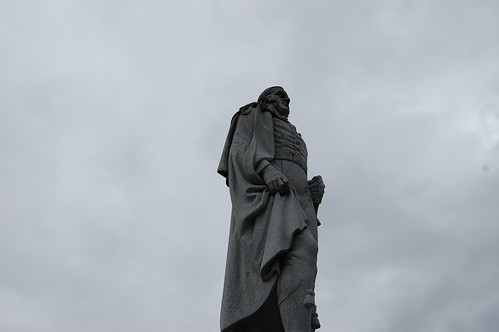Education …
/
During my senior year of college, I took a course on Norwich University's history. Initially, I wasn't a huge fan of the idea of the course, because honestly, how intertesting is the history of one's own institution? I ended up loving the course, and wound up typing up a piece on the Norwich University students who fought at Normandy, and went to France to talk about it.
One of the things that I really took away from the course was the school's founder, Alden Partridge, and his ideas about education. He was an incredibly patriotic man, who believed in the idea of a citizen soldier, but who also believed in a well rounded education. One of the big things that I learned was the idea of experiencial learning, and how much of the school's history was set around this style of learning. Partridge would take students out on hikes, marches, field trips, while bringing in experts on all sorts of vocations, but also making sure that his students got out of the classroom and into the field, where students could learn something hands on.
While I majored in History at Norwich, I also minored in Geology, which I think Partridge would have liked - a mixture of sciences and arts. The Geology department at the school is absolutely fantastic, and those classes are amongst the ones that I miss the most while at the school. We took field trips - lots of them. It wasn't uncommon during some of my courses that we would get together on a weekend and end up in the middle of New York while looking at rocks along the way to see how the rock beds changed as we went further into what was a sea. More memorable, however, was the geology trips to the American southwest, where we visited and studied the Colorado Plateu and Grand Canyon. I feel that because I saw this all close up, I understand it far better than I ever could have by mere examination in a book.
Over the past couple of months, I've gotten hooked on a webpage called Not Always Right, which features stories from people in service postitions and their odd, funny or disturbing encounters with customers. While reading these, I'm often astounded at the sheer stupidity of people featured in them, and it makes me a bit sad at just how ignorant, backward or just plain oblivious people can be, and while listening to the radio on a program about the state of education or something along those lines, the root problem to this can be solved by some of Partrige's ideas when it came to teaching - experiencial learning can help to solve some of the problems.
I think that the biggest problem that the United States faces when it comes to educating students is that our education system is largely out of touch with how life really works. Thinking back to high school, I can narry remember a class in which I learned something useful that I apply to today. Most of my social interactions I've learned from summer camp, where I could work with people in the real world. But in school, I never really learned how exactly Shakespheare fit in with a job or anything along those lines.
The general consensus seems to be that our education system is very out of date and needs to be revised because a lot of students aren't learning what they really need to learn. The content is there, but it seems to me that people aren't making the connection between the academic world, and how to apply things in real life. Looking back to High School and College, the best classes that I had were the ones that the teacher worked to link the class's content with real world applications. In classes such as tech, mathematics, sciences seem to have concepts that are much mroe easily applied in the real world, while classes such as history and other social sciences are a bit tricky, but it is doable.
What the US needs to do is look to experts in the education field and to see just how kids are learning nowadays. The argument of "It worked for me" just doesn't work because the world that we live in is constantly changing - what might have worked for a politician years ago might not even apply now.
Learning and education is the most important thing that we can spend money on - teachers shouldn't be cut back, and we need programs that help to support failing schools, rather than undercut their support when they clearly need it the most. But above that, we need to teach people how to think, reason and operate in the world once they come out of the educational system and into the real world.
